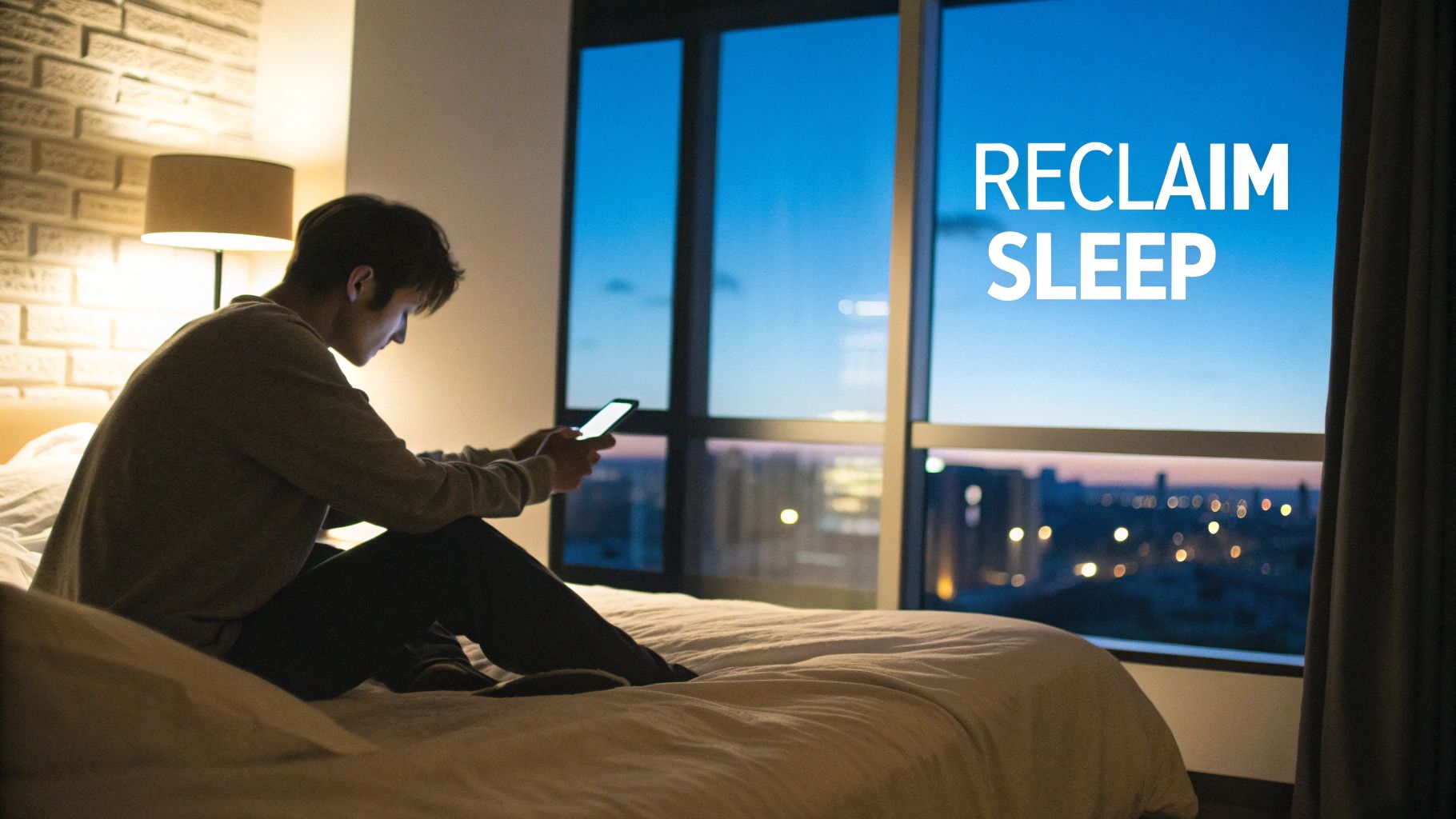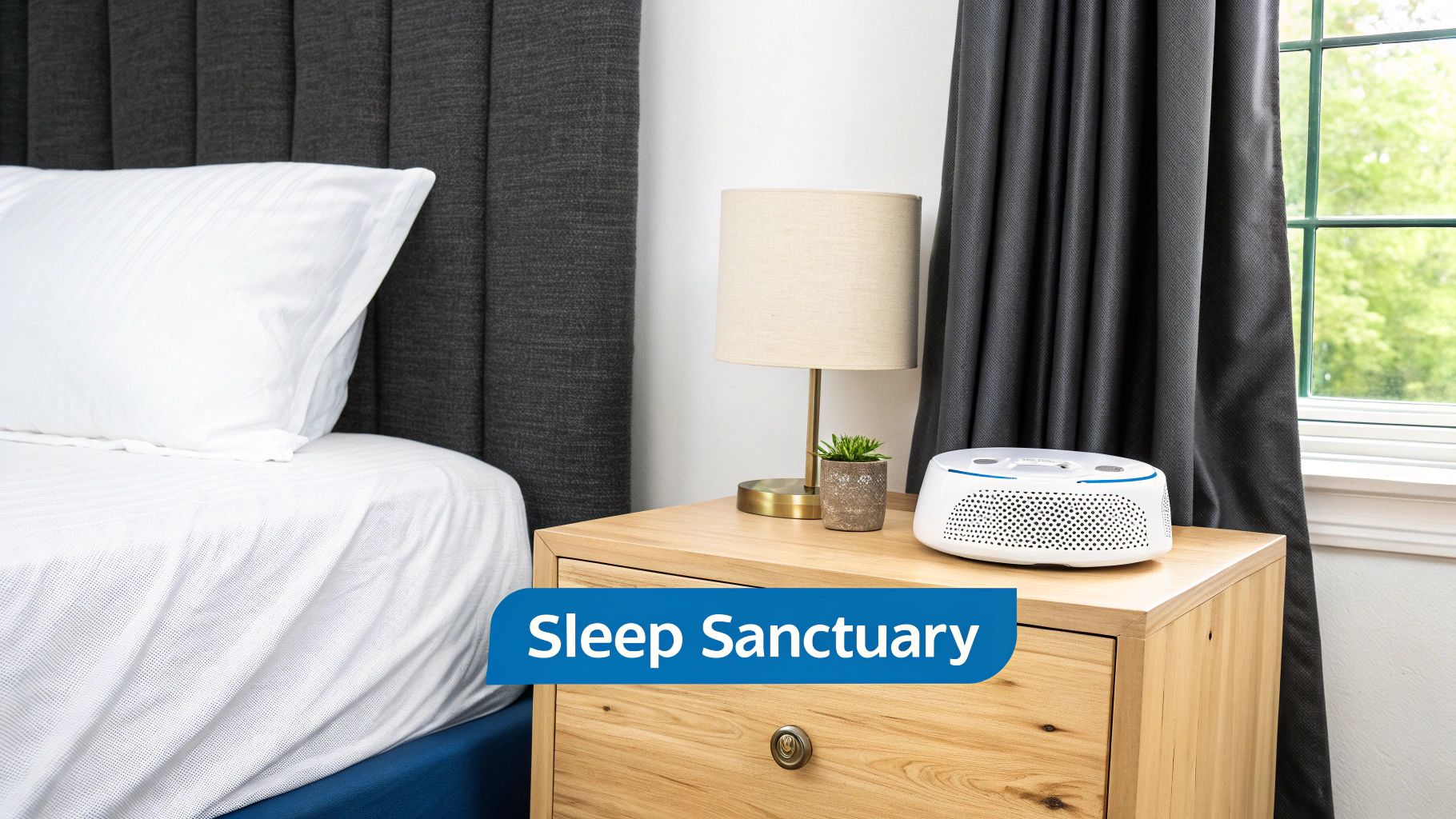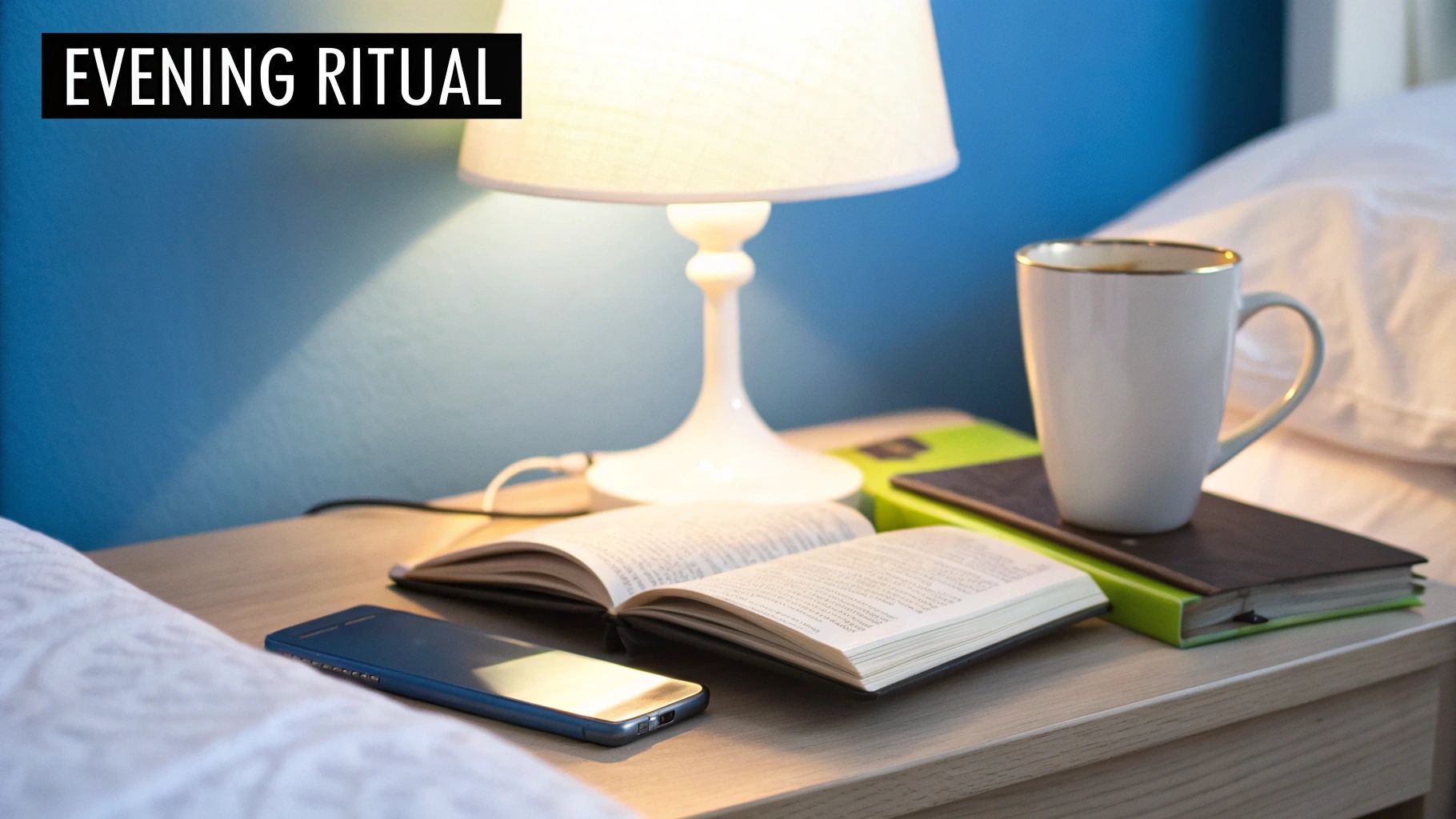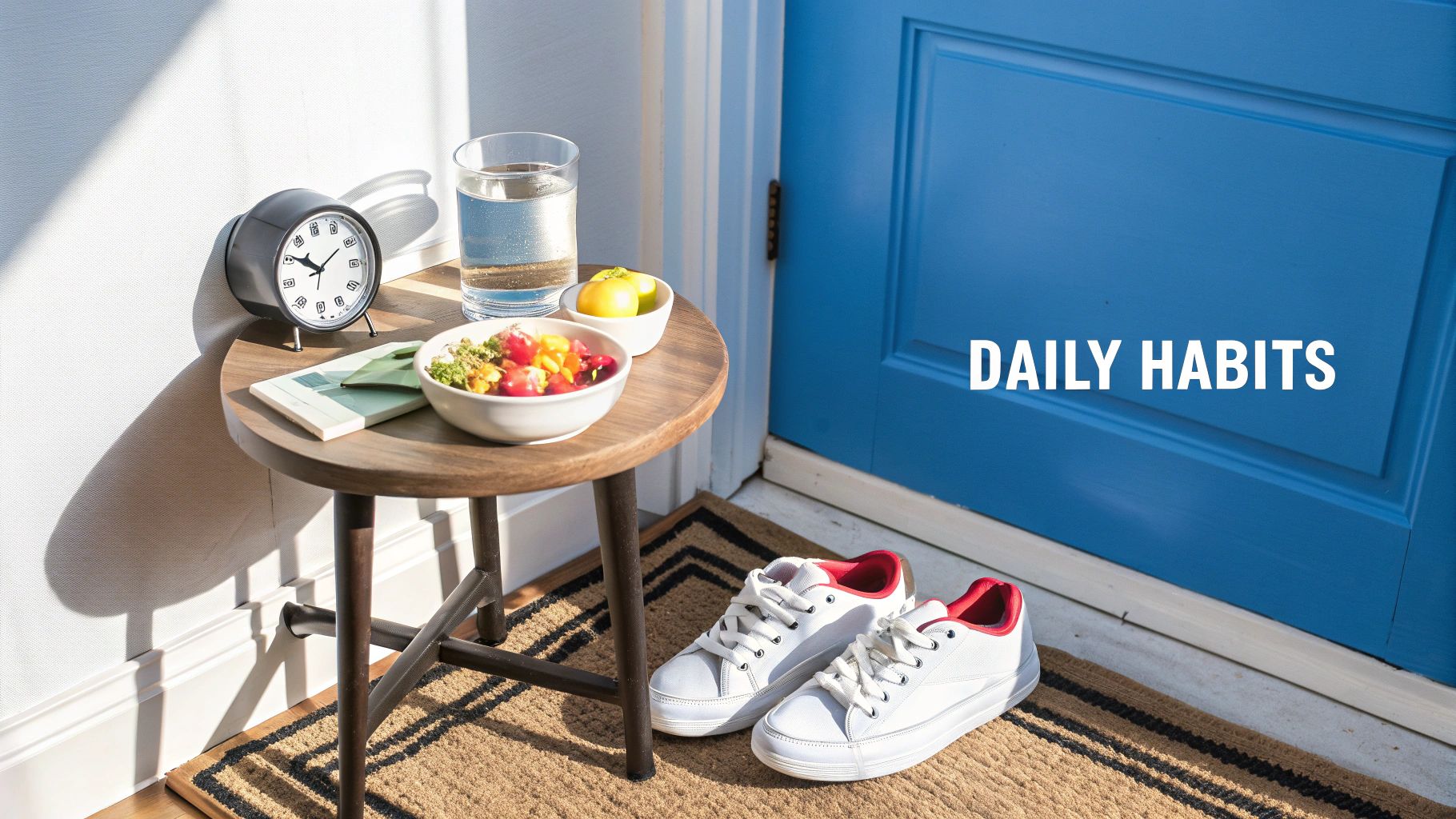To get better sleep naturally, you really have to focus on two things: building a solid routine and creating an environment that screams "rest." This means getting serious about a regular sleep schedule, ditching the screens before bed, and turning your bedroom into a dark, quiet, cool sanctuary. These small, consistent tweaks are always more powerful than quick fixes when you're chasing deep, restorative sleep.
Why Natural Sleep Solutions Matter More Than Ever

That feeling of being completely drained? It’s become the norm for way too many of us. Our always-on culture pushes us to do more, often sacrificing rest in the process. Quality sleep feels less like a biological need and more like a luxury.
It's a perfect storm, really. The constant glow of our phones, packed schedules, and the low-hum of daily stress all conspire to sabotage our ability to truly unwind and recharge.
This isn't just a feeling; the data backs it up. One recent report, after analyzing over 105 million nights of sleep, found a noticeable dip in global sleep quality. The average slipped from 74.26% to 73.92%. It might not sound like a huge drop, but it signals a widespread problem affecting everything from our mood to our immune system. You can dig into the full analysis of global sleep trends on SleepCycle.com.
The Downside Of Ignoring Our Natural Rhythms
When we consistently blow past our body’s internal clock, we rack up a serious "sleep debt." This isn't just about feeling tired. It messes with our ability to think clearly, weakens our immune defenses, and throws our emotions out of whack.
Pushing through with another cup of coffee or relying on sleep aids might get you through the day, but they're just band-aids. They do nothing to fix the actual problem.
True restoration comes from aligning our habits with our biology. Natural sleep solutions work because they support the body's innate processes rather than trying to override them.
The struggle for good sleep is particularly intense for new parents, which makes finding practical strategies for new parents to achieve quality sleep an absolute must. But this just highlights a universal truth: no matter your stage of life, sustainable habits are what make the difference.
Leaning into natural methods is all about playing the long game for your wellness. Instead of searching for a magic pill, this guide is about building a solid foundation for better rest. We’ll walk through the simple, actionable adjustments you can make to your environment, routine, and daily habits that lead to profound improvements in how you feel, day in and day out.
Before we dive in, let's look at the core principles we'll be covering.
Pillars of Natural Sleep Improvement
| Strategy Pillar | Key Action | Primary Benefit |
|---|---|---|
| Environmental Control | Optimizing your bedroom for darkness, quiet, and cool temperatures. | Creates a sanctuary that signals to your brain it's time for rest. |
| Routine & Consistency | Establishing a regular sleep-wake cycle, even on weekends. | Reinforces your body's natural circadian rhythm for easier sleep onset. |
| Lifestyle Adjustments | Managing diet, exercise, and screen time to support sleep. | Reduces sleep disruptors and promotes relaxation. |
| Relaxation Techniques | Incorporating mindfulness, breathing, or gentle stretches. | Calms the nervous system and quiets a racing mind before bed. |
This table gives you a snapshot of our approach. Each pillar supports the others, creating a powerful, holistic strategy for reclaiming your nights.
Design Your Ultimate Sleep Sanctuary

Your bedroom should be a haven dedicated to one thing: rest. Far too often, though, it doubles as a satellite office, a home gym, or a late-night cinema. To really get a handle on your sleep, you have to reclaim this space and engineer it for pure, uninterrupted rest.
It all starts by transforming your bedroom from a multi-purpose room into a true sleep sanctuary. The goal here is to send a clear, powerful signal to your brain: when you walk through that door at night, it's time to power down. This isn't about expensive renovations; it's about smart, strategic control over your environment.
Master the Core Environmental Controls
Think of your sleep environment as having three primary pillars: light, sound, and temperature. Getting these right can make an immediate and profound difference in how deeply you sleep. Each one plays a distinct role in either supporting or sabotaging your body's natural sleep processes.
Let's break down how to dial in each one.
Embrace Absolute Darkness
Even a tiny sliver of light from a streetlamp or the glowing LED on your phone charger can disrupt your sleep cycle. Any light exposure tells your brain to pump the brakes on producing melatonin, the essential hormone that governs sleep.
- Blackout Curtains: This is probably the single most effective investment you can make for blocking external light. They’re a game-changer.
- Cover Electronics: A simple piece of electrical tape or a light-dimming sticker over the tiny LEDs on chargers and TVs works wonders.
- Wear a Sleep Mask: If you can't get your room pitch-black, a comfortable mask like DubsLabs’ Total Dark Sleep Mask guarantees complete darkness no matter what.
Your brain doesn’t need much light to register that it's "daytime." Creating a pitch-black environment is one of the fastest ways to tell your internal clock it’s time to sleep and stay asleep.
Cultivate Consistent Quiet
Sudden noises—a car horn, a neighbor's door slamming—can easily pull you out of deep sleep, even if you don't fully wake up. The key isn't necessarily total silence, but rather creating a consistent, predictable soundscape.
A white noise machine, for example, can create a soothing, constant hum that masks those abrupt, disruptive sounds. Alternatively, if you find traditional earbuds uncomfortable, the ultra-thin design of DubsLabs Bedphones lets you listen to calming sounds or white noise without digging into your ears. This is a lifesaver, especially if you're a side sleeper. For a deeper dive into creating the perfect soundscape, you can check out our complete guide on how your sleep environment affects sleep quality.
Fine-Tune Temperature and Comfort
The final piece of the environmental puzzle is temperature. Your body's core temperature naturally drops to initiate sleep, and a cool room makes that process much easier.
Research suggests the sweet spot is somewhere between 60 and 67 degrees Fahrenheit (15.6 to 19.4 degrees Celsius). Play around within this range to find what feels best for you.
Beyond the thermostat, don’t forget about your bed itself. A supportive mattress and the right pillows for your sleeping position (side, back, or stomach) are critical for preventing all that tossing and turning. For a final touch, try adding a calming scent like lavender through a diffuser. It's one more signal to your senses that the day is done and it's time for some deep, restorative rest.
Master Your Evening Wind-Down Routine

Trying to jump straight from a late-night work email or an intense TV show into a peaceful slumber is like expecting a speeding car to stop on a dime. It just doesn't happen. Your brain needs time to pump the brakes.
A solid wind-down routine isn’t some feel-good luxury; it’s a non-negotiable step that signals to your body that it’s time to shift gears from "go" mode to "rest" mode. This buffer period allows your nervous system to calm down, your heart rate to slow, and your mind to quiet itself after a long day. Without it, you're just setting yourself up to lie awake, replaying conversations or staring at the ceiling.
Implement a Digital Sunset
If there's one change that can make a massive difference in your sleep quality, it's creating a firm screen-free buffer before bed. That blue light beaming from your phone, tablet, and TV is actively suppressing melatonin production, essentially tricking your brain into thinking it's still midday.
Try to power down all your electronics at least 60 to 90 minutes before you plan to actually sleep. Think of it as your "digital sunset." This creates that crucial window for your body to start producing the hormones you need for deep, restorative rest.
A consistent evening routine is your brain's cue that sleep is approaching. By repeating the same calming activities each night, you train your body to relax and prepare for rest, making it easier to fall asleep and stay asleep.
Fill Your Screen-Free Time Wisely
So, what are you supposed to do in that tech-free hour? The key is picking activities that are genuinely relaxing and don't get your mind racing again. The goal here is gentle disengagement, not another high-focus task.
A few ideas I've found effective:
- Reading a physical book: Unlike an e-reader, a real paper book doesn't emit that disruptive blue light. Get lost in a good story.
- Light stretching or yoga: Gentle movements are fantastic for releasing the physical tension that builds up in your muscles throughout the day.
- Journaling: Worried about tomorrow? Write it down. Getting your to-do list or anxieties out of your head and onto paper can stop you from ruminating all night.
- Taking a warm bath: It's not just relaxing. The drop in your body temperature after you get out actually mimics a natural process that helps kickstart sleep.
Sipping a cup of herbal tea like chamomile or valerian root can also be a wonderful part of this ritual. These herbs contain compounds with mild sedative effects, naturally promoting a sense of calm and drowsiness.
The magic is all in the consistency. Find a few things you actually enjoy and make them a non-negotiable part of your nightly schedule. For more ideas on crafting the perfect pre-sleep ritual, you can explore our detailed guide on building a bedtime routine for your best sleep. This predictable sequence becomes a powerful, self-reinforcing habit that paves the way for a night of deep, uninterrupted rest.
Weave Healthy Habits Into Your Day for Better Sleep at Night

The quality of your sleep tonight actually started this morning. It’s easy to forget, but the choices you make from the moment you wake up—what you eat, when you move your body, and how you handle stress—directly feed into your ability to get deep, restorative rest later. Improving your sleep naturally isn’t just about what you do an hour before bed; it’s about looking at your entire 24-hour cycle.
If there’s one habit that makes the biggest difference, it's this: a consistent sleep-wake schedule. Going to bed and waking up around the same time every single day (yep, even on weekends) is like an anchor for your body’s internal clock, also known as your circadian rhythm. When your body knows what to expect, it gets much better at regulating the hormones that make you feel sleepy or wide awake.
Master Your Diet and Timing
What you put into your body has a massive impact on your sleep. It’s not just what you eat, but when you eat it. Certain foods can help you drift off, while others will absolutely sabotage your night.
Think about it: a huge, heavy meal right before bed forces your digestive system to work overtime when it should be powering down. That can lead to discomfort, indigestion, and a night of tossing and turning. The same goes for sugary snacks, which can cause a blood sugar spike and then a crash that might jolt you awake in the middle of the night.
- Avoid Caffeine After 2 PM: This is a big one. Caffeine has a long half-life and can hang around in your system for up to 8 hours, making it tough to fall asleep.
- Limit Alcohol Before Bed: A nightcap might feel like it helps you doze off, but alcohol actually messes with the later, more restorative stages of sleep, leaving you feeling groggy.
- Embrace Sleep-Friendly Foods: Try incorporating foods rich in magnesium and tryptophan into your evening meal or snack. Things like almonds, turkey, and bananas can help support your body’s natural melatonin production.
Time Your Exercise for Maximum Benefit
Getting some physical activity in every day is fantastic for your sleep. It can help you fall asleep faster and increases the time you spend in that delicious deep sleep stage. It’s also one of the best tools out there for managing stress, which is a major sleep killer.
But the timing is key. Intense exercise too close to bedtime can backfire. It jacks up your core body temperature and floods your system with stimulating hormones like cortisol and adrenaline, making it nearly impossible to wind down. A good rule of thumb is to wrap up any vigorous workouts at least three hours before you plan to hit the hay.
Your daily activities build up something called "sleep pressure"—that biological need for sleep. By staying active and engaged during the day, you ensure this pressure is strong enough by nightfall to help you fall asleep quickly and stay asleep.
Proactively Manage Daily Stress
Let’s be honest, stress is one of the biggest enemies of good sleep. When you’re stressed, your body is swimming in cortisol, keeping you in a state of high alert that’s the complete opposite of what you need for rest. You can't just flip a switch and turn off a racing mind when your head hits the pillow.
The trick is to weave stress-management techniques into your day so that tension doesn't follow you to bed. This could be as simple as a short walk at lunch, taking a few minutes for deep breathing exercises, or just putting on some calming music. A recent global survey actually confirmed that stress and anxiety are huge barriers to sleep, especially for women, who tend to report fewer nights of quality sleep than men. You can dig into more of those insights about these global sleep disparities on ResMed.com.
Building these daytime habits is a huge part of what makes for great sleep hygiene. It all works together to make sure your body and mind are truly ready for rest when it's time to go to bed.
Recognize When to Seek Professional Help
Trying all these natural strategies is a fantastic way to take control of your sleep. For many people, a few tweaks to their environment and daily habits are all it takes. But sometimes, they just aren't enough.
It’s so important to know when a sleep problem is more than just a bad habit. If you’ve been putting in the work—blacking out your windows, sticking to a wind-down routine, and managing your lifestyle—but you’re still staring at the ceiling night after night, your body is trying to tell you something.
Persistent sleep issues that don't get better with these kinds of changes are a big sign that there might be an underlying medical condition at play. Self-help is powerful, but it can’t solve everything. Knowing when to call in a professional is a crucial step toward finally getting the rest you need.
Identifying the Red Flags
Certain symptoms are more than just signs of a few rough nights. They're red flags that shouldn't be ignored. Don't just write these off as "being tired"—they could point to a bigger issue.
Keep an eye out for these specific warning signs:
- Chronic Insomnia: This isn't just a night or two of bad sleep. We're talking about a consistent struggle to fall asleep, stay asleep, or waking up way too early at least three nights a week, for three months or more.
- Loud, Frequent Snoring: This is especially concerning if it comes with gasping or choking sounds. While many things can cause snoring, it's also one of the main symptoms of sleep apnea, a serious condition that requires a proper medical diagnosis.
- Overwhelming Daytime Sleepiness: Feeling an uncontrollable need to nap during the day, even when you think you got a full night's sleep. This kind of exhaustion can seriously impact your job, your safety, and your quality of life.
- Unusual Nighttime Behaviors: This could be anything from physically acting out vivid dreams to sleepwalking. It also includes that uncomfortable "creepy-crawly" feeling in your legs at night, which is a classic sign of Restless Legs Syndrome.
The Gold Standard for Persistent Insomnia
For anyone who feels like they’re in a constant battle with insomnia, getting professional help can be life-changing. A global study found that a staggering 16.2% of adults suffer from insomnia, a condition that deeply affects mental health.
One of the most effective, drug-free treatments out there is Cognitive Behavioral Therapy for Insomnia (CBT-I). It’s considered the gold-standard treatment because it gets to the root of the problem: the negative thoughts and bad habits that are wrecking your sleep.
CBT-I isn't just about getting generic advice. It’s a structured program led by a trained therapist who helps you challenge those anxious thoughts about sleep and build a truly healthy sleep routine from the ground up. It’s a proven way to break the cycle of sleeplessness for good.
If any of this sounds familiar, please don't wait. Making an appointment with your doctor or a sleep specialist isn't admitting defeat. It’s taking an empowered step to get the right diagnosis and the effective treatment you deserve.
Got Questions About Improving Your Sleep? We've Got Answers
Making big changes to your lifestyle, especially around something as personal as sleep, always brings up a few questions. That's completely normal. When you're trying to fix your sleep for the long haul, you want to know you're on the right track.
Let's dive into some of the most common questions people have when they start their journey toward better, more natural sleep.
How Long Until I Actually See Results?
This is the big one, isn't it? The honest answer is: it really depends. Unlike popping a pill, natural methods are all about gently guiding your body's internal clock back into alignment. It’s a process. Some people feel a real difference in just a few days, especially if they make a huge change like implementing a strict "digital sunset" every night.
For most of us, though, the benefits build up over time. Think of it like hitting the gym. You don't expect to see a six-pack after one workout, right? But after a few weeks of showing up, you start feeling stronger and seeing changes. Give your new habits a real shot—stick with them for at least two to four weeks so your body can truly adapt.
Improving your sleep naturally isn’t a quick fix. It’s about building a solid foundation for a lifetime of good rest. Consistency will always trump perfection.
Will Napping Mess Up My Sleep at Night?
Napping can be a tricky thing—it's a bit of a double-edged sword. A quick, well-timed nap can be an incredible tool for sharpening your focus and beating that afternoon slump. But if you get the timing or length wrong, you can absolutely sabotage your sleep later that night.
If you're going to nap, just follow a couple of simple rules:
- Keep It Short and Sweet: Aim for about 20-30 minutes. That's the sweet spot for feeling refreshed without falling into a deep sleep that leaves you feeling groggy and out of it.
- Time It Right: The best window for a nap is in the early afternoon, usually between 1 PM and 3 PM. Napping any later than that can drain your "sleep pressure"—that natural feeling of tiredness that helps you fall asleep at your regular bedtime.
A strategic power nap? Fantastic. A long, late-afternoon snooze? You’re probably just borrowing energy from tonight.
What Should I Do If I Wake Up in the Middle of the Night?
First off, it's completely normal to wake up for a moment or two during the night. The real problem is when you can't drift back off. When that happens, the absolute worst thing you can do is lie there, staring at the ceiling, and stressing about how awake you are.
If you find yourself wide awake for more than 20 minutes, just get out of bed. Go to another room and do something quiet and calming in very low light. Think reading a book (a real one, not on a screen) or listening to some chill music. Whatever you do, do not look at your phone. That blue light is like a shot of espresso for your brain.
Once you start feeling that sleepy feeling creep back in, head back to bed. This little routine helps your brain keep a strong connection between your bed and sleeping, not your bed and tossing and turning in frustration.
We all have questions when we're trying something new. Below, we've put together a quick FAQ table to tackle some more common queries about getting your sleep back on track, naturally.
| Question | Answer |
|---|---|
| Is it bad to eat right before bed? | A large, heavy meal can disrupt sleep. If you're hungry, a light snack like a banana or a small bowl of oatmeal about an hour before bed is usually fine and can even promote sleep. |
| Can exercise too close to bed keep me up? | Intense exercise right before bed can be too stimulating for some. It's best to finish vigorous workouts at least 2-3 hours before you plan to sleep. Gentle stretching or yoga, however, can be very relaxing. |
| Does "catching up" on sleep on weekends work? | While it feels good, it's not a true substitute for consistent sleep. It can throw off your internal clock, making it harder to wake up on Monday. Consistency is always the better long-term strategy. |
| Are all sleep supplements safe? | Natural supplements like melatonin or valerian root can help, but it's crucial to talk to your doctor first. They can have side effects and interact with other medications. |
Hopefully, these answers help clear things up as you build a sleep routine that works for you.
Crafting the perfect sleep routine is a personal journey, and having the right tools makes all the difference. DubsLabs offers products like Bedphones and Total Dark Sleep Masks designed to create an ideal rest environment. Discover how our solutions can support your goal of deeper, more restorative sleep at https://www.dubslabs.com.











































